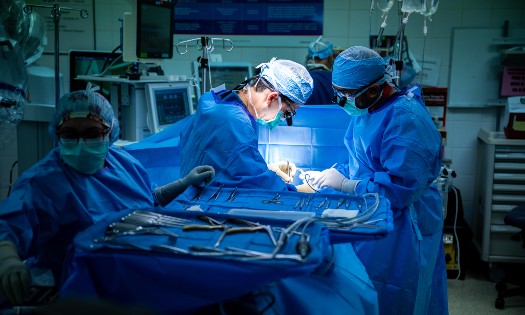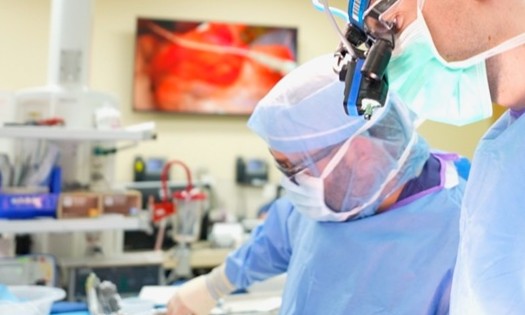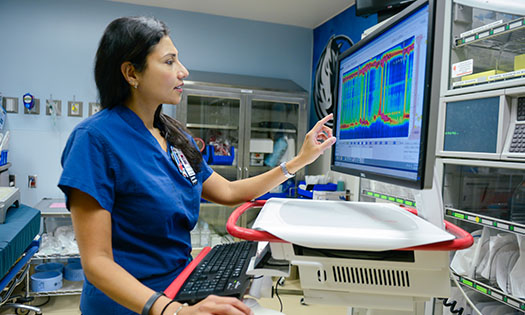About 1 in 5,000 children are born with complex colorectal and pelvic defects that can impede their bowel and urinary function from birth, and their reproductive and sexual function later in life. Children with these anomalies require the care of specialists from multiple disciplines. The Colorectal and Pelvic Center at Children’s Medical Center Dallas, part of Children’s Health℠, is one of the only places in North Texas that brings this expertise together on one team.
“Colorectal anomalies are rare and highly variable. Surgical correction is seldom ‘one and done’ and many of these children will face lifelong challenges and multiple surgeries,” says Charles Hong, M.D., Pediatric Surgeon at Children’s Health and Assistant Professor at UT Southwestern. “Our goal is to reconstruct the anatomy to maximize a child’s potential for normal bowel and bladder habits and provide the ongoing care that makes it possible.”
Team approach to prioritizing immediate needs and long-term planning
Regardless of when a child is diagnosed, the Colorectal and Pelvic Center (CPC) team at Children’s Health works together to prioritize their immediate needs and develop a treatment plan that evolves throughout a patient’s childhood.
Newborns typically have a procedure that lets them safely pass waste within a few days of birth. For babies with less complicated anorectal malformations, this initial procedure may be a surgical repair to place the anus between the sphincter muscles and create an anal opening that allows stool to exit. Newborns with more complex malformations typically have a colostomy so future reconstructive procedures can wait until the child is older.
Depending on the child’s individual anatomy and issues, their treatment plan can include multiple surgeries at different stages of life as part of long-term, multidisciplinary follow-up care.
“It’s important to have us all on board for long-term planning because bladder and bowel function are so dependent on each other,” says Irina Stanasel, M.D., Pediatric Urologist at Children’s Health and Assistant Professor at UT Southwestern. “I bring my urological expertise and my partners bring their clinical expertise to the same space. Not only do we learn from each other, but we can reduce the number of trips to the operating room.”
‘One-stop’ center improves quality of care and patient experience
The multidisciplinary CPC team includes three pediatric general surgeons, three pediatric urologists, two pediatric gastroenterologists and a pediatric gynecologist. The team routinely consults with other specialists since nearly 60% of children born with colorectal and pelvic anomalies also have congenital anomalies that affect their heart, spine, kidneys and airways.
The team holds one multidisciplinary colorectal clinic per month. The day starts with an hour-long meeting involving all providers for that clinic day where each patient’s latest test results and studies are reviewed together.
“Our discussions are complex, and having all the data and imaging is essential to our planning,” says Dr. Hong. “Our nurse program manager and colorectal nurse practitioner who coordinate the clinic make sure we have everything we need to prepare for each child. We couldn’t do it without them.”
Most families choose to meet with the specialists simultaneously so they can listen in as the providers discuss their child’s condition.
“Our families tell us they appreciate coming to just one appointment and hearing us confer,” says Dr. Stanasel. “From our perspective, hearing our partners’ thoughts informs our own decision making and results in better care.”
Caring for kids with the rarest, severest malformations
The CPC team routinely cares for a wide variety of congenital colorectal and pelvic conditions – such as anorectal malformations, associated urologic anomalies, Hirschsprung disease, and any other pelvic malformations that can impact GI and urinary function. The CPC is also a referral center for the most complex variations of these conditions – such as cloacal anomalies, cloacal exstrophy, long segment Hirschsprung disease and redo procedures.
“One of the things we do really well is work with very complex patients who have a lot of issues going on. We see a high volume of these patients and a big part of their care is following them throughout their childhood,” says Dr. Hong.
Why Children’s Health: The power of collective expertise
Many children with complex colorectal anomalies have issues throughout their lives with constipation, fecal incontinence or urinary incontinence. The team works closely to anticipate and address their needs, whether prescribing preventive antibiotics, monitoring their renal function or making sure they are able to void and stool adequately.
“Our non-surgical care is one of the most beneficial things we provide to our patients,” says Dr. Stanasel. “As surgeons, we make sure there isn’t a physical cause to their health issues – but for many of our kids, our Pediatric Bowel Management Program, family education, and access to a variety of treatment modalities are a huge part of their care.”
The team also focuses on improving care and quality of life for their patients. Two initiatives underway include:
Membership in the Pediatric Colorectal and Pelvic Learning Consortium (PCPLC), a group of the best colorectal centers in the U.S. who are combining efforts to identify best practices and advance care.
Developing relationships with providers in the Dallas area to provide a more seamless transition to adult care for patients as they age out of pediatrics.
“Our families benefit from our collective expertise, and we continue to learn from each other,” says Dr. Stanasel. “There’s no doubt that working together leads to better care.”
Listen to our latest podcast episode about the Colorectal and Pelvic Center to learn more.


